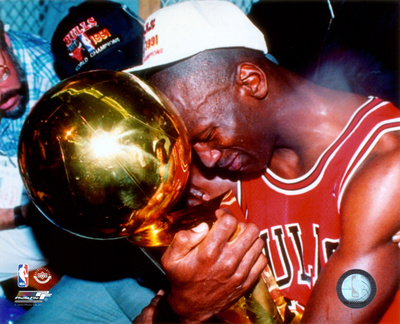Woah, I thought this was starting Monday or Tuesday.
 VOTE #1: Michael Jordan
VOTE #1: Michael JordanIf you look at the broad range of ciriteria used to rank players, wheter it be career value, primes, impact, maximizing team's chances, skillset, 2-way ability, accolades, you name it.....MJ is either at the Top or in the Top 5 or so.
If we break down the Top 3 from each era, we get:
Pre-Shot clock:Mikan
Cousy
Dolph
Post Shot-Clock/Pre-ABA(57:Russell
Wilt
West/Oscar
Split Leagues Era:KAJ
Dr. J
Barry
Golden Era:Magic
Bird
Moses
NBA on NBC Era:MJ
Hakeem
Mailman
Post-MJ Era:Kobe
Duncan
Shaq
Big not 2, not 3, not 4 star players on 1 team Era(2012-):Lebron
Durant
CP3?
--------------------------------------------------------------------------------------------------------------------------
Now not all eras are created equal, so I decided to give a ranking score to each Era, based on the top 50 players from the last Top 100 list. Players are placed in era by their primes.
Total players listed in Top 5013 - Post-MJ Era
12 - NBA on NBC Era
11 - Split Leagues Era
6 - Golden Era
6 - Post Shot-Clock/Pre-ABA
1 - Pre-Shot-Clock Era
1 - 2012+ Era(obivoulsy just a few year sample, can easily merge with Post-MJ era)
What immediately sticks out is how few Top 50 players the Golden era of Magic/Bird had in their primes, and how few the Wilt/Russell era did. We tend to put players from both these eras on a pedestal, but its clear that the talent level was significantly higher from the 90's to now considering that 25 out of the Top 50 players came from this period.
Total players listed in Top 205 - Post-MJ Era
5 - Post Shot-Clock/Pre-ABA
4 - NBA on NBC Era
3 - Golden Era
2 - Split Leagues Era
1 - 2012+ Era
0 - Pre-Shot-Clock Era
Total players listed in Top 103 - Post-MJ Era
3 - NBA on NBC Era
2 - Golden Era
2 - Post Shot-Clock/Pre-ABA
1 - Split Leagues Era
0 - Pre-Shot-Clock Era
0 - 2012+ Era
The Post-MJ Era is clearly the deepest with talent, and also has the most players in every category. The NBA on NBC era is #2, and the Wilt/Russ era is a top-heavy #3 based mostly on having 5 players in the Top 20, though hurt is bad depth of talent.
------------------------------------------------------------------------------------------------------------------------------------------
So when I look at MJ, I see someone who ranks at the top or near the top in every criteria used for ranking players. I also see him playing in the 2nd toughest NBA era, and dominating it in both individual/team impact.
Russell was great in his era, but he did play in a league of 8-10 teams, and in a NBA with lesser overall talent. I also don't feel his imapct translates to other eras at the same level. he would still be a great defender, but his lack of scoring ability would be problematic considering how restrictive the salary cap is. Russell is not #1 or #2 option material either. Wilt's ratio of statistical impact to team impact is low, and I place him #2 in his era, so no GOAT for him.
Kareem is the clear #1 for his era....but its hard to ignore the 3 years of not making the playoffs in his prime. If we were talking high school/college, then Kareem is GOAT, but despite his longevity, I'm re-thinking Kareem's rank. is he truly greater than Magic? Or what about the trio from the Post-MJ era? Wilt? Criticisms that vex other players seem to evade Cap. I dont' understand why his teams didn't do more in a split NBA/ABA, and with no one else save Walton for a period around.
Magic is ahead of Bird for me, but like Bird he leaves alot to be desired on one end of the court. Also, the "Golden" era may have saved the NBA...but it's overrated. Magic himself played on a loaded team like Bird did, and only 6 Top 50 players had their primes in that era. guys like MJ/Hakeem/Barkley/Ewing all were just entering back when Magic/Bird were battling. Like Kareem, I have to re-think his ranking. Strange, Magic is my favorite player ever, never thought I would feel this way.
Kobe/TD/Shaq are all underrated frankly. They played in the deepest era in NBA history. They went head to head like Magic/Bird did, and I feel all 3 were better 2-way players in their primes. last time around I had Bird udner all 3, and this time around Magic man may take a tumble. When you consider impact/longetivity/team imapct, they all eclipse Magic/Bird...but I guess that's a debate for later. I can't put any of them as over MJ.
Lebron is the clear best player of the 2012(post-lockout) and on era. He had great statistical season in the 00's, but the correlation to team impact is lacking similar to Wilt. Has quite a bit to do to even sniff MJ at this point.
So MJ is my clear #1.




















